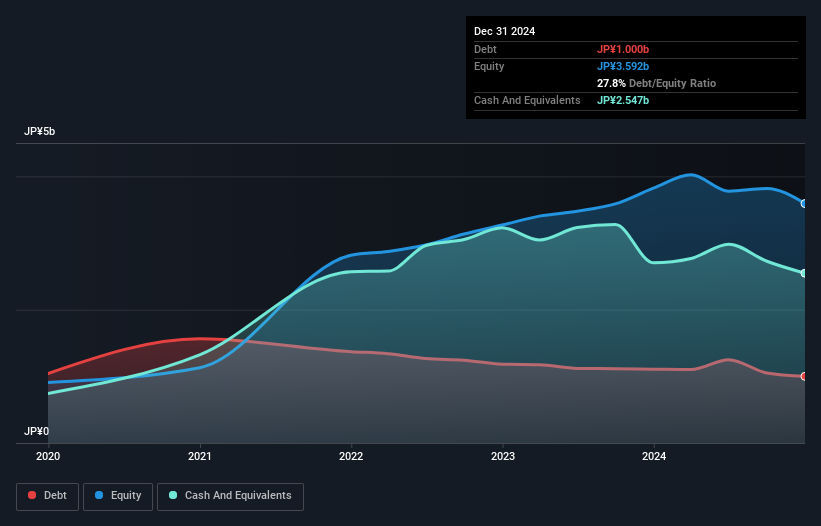Warren Buffett famously said, 'Volatility is far from synonymous with risk.' So it seems the smart money knows that debt - which is usually involved in bankruptcies - is a very important factor, when you assess how risky a company is. As with many other companies LaKeel, Inc. (TSE:4074) makes use of debt. But the more important question is: how much risk is that debt creating?
Why Does Debt Bring Risk?
Debt is a tool to help businesses grow, but if a business is incapable of paying off its lenders, then it exists at their mercy. In the worst case scenario, a company can go bankrupt if it cannot pay its creditors. However, a more common (but still painful) scenario is that it has to raise new equity capital at a low price, thus permanently diluting shareholders. Of course, the upside of debt is that it often represents cheap capital, especially when it replaces dilution in a company with the ability to reinvest at high rates of return. When we think about a company's use of debt, we first look at cash and debt together.
What Is LaKeel's Debt?
As you can see below, LaKeel had JP¥1.00b of debt at December 2024, down from JP¥1.11b a year prior. But it also has JP¥2.55b in cash to offset that, meaning it has JP¥1.55b net cash.

How Healthy Is LaKeel's Balance Sheet?
Zooming in on the latest balance sheet data, we can see that LaKeel had liabilities of JP¥2.05b due within 12 months and liabilities of JP¥361.0m due beyond that. On the other hand, it had cash of JP¥2.55b and JP¥789.0m worth of receivables due within a year. So it can boast JP¥928.0m more liquid assets than total liabilities.
This short term liquidity is a sign that LaKeel could probably pay off its debt with ease, as its balance sheet is far from stretched. Succinctly put, LaKeel boasts net cash, so it's fair to say it does not have a heavy debt load!
View our latest analysis for LaKeel
It is just as well that LaKeel's load is not too heavy, because its EBIT was down 28% over the last year. When a company sees its earnings tank, it can sometimes find its relationships with its lenders turn sour. There's no doubt that we learn most about debt from the balance sheet. But ultimately the future profitability of the business will decide if LaKeel can strengthen its balance sheet over time. So if you want to see what the professionals think, you might find this free report on analyst profit forecasts to be interesting.
Finally, while the tax-man may adore accounting profits, lenders only accept cold hard cash. While LaKeel has net cash on its balance sheet, it's still worth taking a look at its ability to convert earnings before interest and tax (EBIT) to free cash flow, to help us understand how quickly it is building (or eroding) that cash balance. During the last three years, LaKeel generated free cash flow amounting to a very robust 83% of its EBIT, more than we'd expect. That positions it well to pay down debt if desirable to do so.
Summing Up
While we empathize with investors who find debt concerning, you should keep in mind that LaKeel has net cash of JP¥1.55b, as well as more liquid assets than liabilities. And it impressed us with free cash flow of JP¥614m, being 83% of its EBIT. So we don't have any problem with LaKeel's use of debt. The balance sheet is clearly the area to focus on when you are analysing debt. However, not all investment risk resides within the balance sheet - far from it. These risks can be hard to spot. Every company has them, and we've spotted 3 warning signs for LaKeel you should know about.
At the end of the day, it's often better to focus on companies that are free from net debt. You can access our special list of such companies (all with a track record of profit growth). It's free.
New: AI Stock Screener & Alerts
Our new AI Stock Screener scans the market every day to uncover opportunities.
• Dividend Powerhouses (3%+ Yield)
• Undervalued Small Caps with Insider Buying
• High growth Tech and AI Companies
Or build your own from over 50 metrics.
Have feedback on this article? Concerned about the content? Get in touch with us directly. Alternatively, email editorial-team (at) simplywallst.com.
This article by Simply Wall St is general in nature. We provide commentary based on historical data and analyst forecasts only using an unbiased methodology and our articles are not intended to be financial advice. It does not constitute a recommendation to buy or sell any stock, and does not take account of your objectives, or your financial situation. We aim to bring you long-term focused analysis driven by fundamental data. Note that our analysis may not factor in the latest price-sensitive company announcements or qualitative material. Simply Wall St has no position in any stocks mentioned.
About TSE:4074
Flawless balance sheet and undervalued.
Market Insights
Community Narratives




